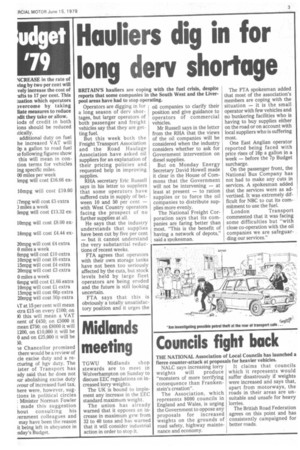Hauliers dig in for long dery shortage
Page 5

If you've noticed an error in this article please click here to report it so we can fix it.
BRITAIN'S hauliers are coping with the fuel crisis, despite reports that some companies in the South West and the Liverpool areas have had to stop operating.
Operators are digging in for a long season of dery shortages, but larger operators of both passenger and freight vehicles say that they are getting fuel.
But this week both the Freight Transport Association and the Road Haulage Association have asked oil suppliers for an explanation of their pricing policies and requested help in improving supplies.
RI-lit secretary Eric Russell says in his letter to suppliers that some operators have suffered cuts in supply of between 10 and 50 per cent — with West Country operators facing the prospect of no further supplies at all.
He says that the industry understands that supplies have been cut by five per cent — but it cannot understand the very substantial reductions of recent weeks.
FTA agrees that operators with their own storage tanks have not been too seriously affected by the cuts, but stock levels held by large fleet operators are being eroded and the future is still looking uncertain.
FTA says that this is obviously a totally unsatisfactory position and it urges the oil companies to clarify their position and give guidance to operators of commercial vehicles.
Mr Russell says in the letter from the RHA that the views of the oil companies will be considered when the industry considers whether to ask for Government intervention on diesel supplies.
But on Monday Energy Secretary David Howell made it clear in the House of Commons that the Government will not be intervening — at least at present — to ration supplies or to force the oil companies to distribute supplies more evenly.
The National Freight Corporation says that its companies are faring better than most. "This is the benefit of having a network of depots," said a spokesman. The FTA spokesman added that most of the association's members are coping with the situation — it is the small operator with few vehicles and no bunkering facilities who is having to buy supplies either on the road or on account with local suppliers who is suffering most.
One East Anglian operator reported being faced with price rises of 16p a gallon in a week — before the 7p Budget surcharge.
On the passenger front, the National Bus Company has not had to make any cuts in services. A spokesman added that the services were as advertised. It was extremely difficult for NBC to cut its commitment to use the fuel.
London Transport commented that it was facing some difficulties but "with close co-operation with the oil companies we are safeguarding our services."




























































































































